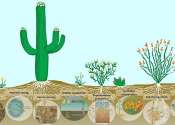A microorganism (from the Greek: μικρός, mikrós, "small" and ὀργανισμός, organismós, "organism"; also spelled micro organism or micro-organism) or microbe is an organism that is microscopic (usually too small to be seen by the naked human eye). The study of microorganisms is called microbiology, a subject that began with Anton van Leeuwenhoek's discovery of microorganisms in 1675, using a microscope of his own design.
Microorganisms are very diverse; they include bacteria, fungi, archaea, and protists; microscopic plants (called green algae); and animals such as plankton, the planarian and the amoeba. Some microbiologists also include viruses, but others consider these as non-living. Most microorganisms are unicellular (single-celled), but this is not universal, since some multicellular organisms are microscopic, while some unicellular protists and bacteria, like Thiomargarita namibiensis, are macroscopic and visible to the naked eye.
Microorganisms live in all parts of the biosphere where there is liquid water, including soil, hot springs, on the ocean floor, high in the atmosphere and deep inside rocks within the Earth's crust. Microorganisms are critical to nutrient recycling in ecosystems as they act as decomposers. As some microorganisms can fix nitrogen, they are a vital part of the nitrogen cycle, and recent studies indicate that airborne microbes may play a role in precipitation and weather.
Microbes are also exploited by people in biotechnology, both in traditional food and beverage preparation, and in modern technologies based on genetic engineering. However, pathogenic microbes are harmful, since they invade and grow within other organisms, causing diseases that kill millions of people, other animals, and plants.









